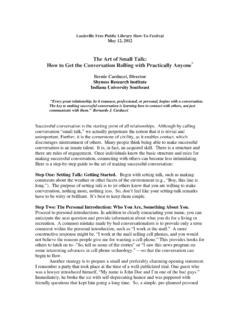Transcription of “A Talk to Teachers” - Saint Paul Public Schools
1 a talk to teachers By James Baldwin(Delivered October 16, 1963, as The Negro Child His Self-Image ; originally published in The Saturday Review, December 21, 1963, reprinted in The Price of the Ticket, Collected Non-Fiction 1948-1985, Saint Martins 1985.) Let s begin by saying that we are living through a very dangerous time. Everyone in this room is in one way or another aware of that. We are in a revolutionary situation, no matter how unpopular that word has become in this country. The society in which we live is desperately menaced, not by Khrushchev, but from within. To any citizen of this country who figures himself as responsible and particularly those of you who deal with the minds and hearts of young people must be prepared to go for broke. Or to put it another way, you must understand that in the attempt to correct so many generations of bad faith and cruelty, when it is operating not only in the classroom but in society, you will meet the most fantastic, the most brutal, and the most determined resistance.
2 There is no point in pretending that this won t happen. Since I am talking to schoolteachers and I am not a teacher myself, and in some ways am fairly easily intimidated, I beg you to let me leave that and go back to what I think to be the entire purpose of education in the first place. It would seem to me that when a child is born, if I m the child s parent, it is my obligation and my high duty to civilize that child. Man is a social animal. He cannot exist without a society. A society, in turn, depends on certain things which everyone within that society takes for granted. Now the crucial paradox which confronts us here is that the whole process of education occurs within a social framework and is designed to perpetuate the aims of society. Thus, for example, the boys and girls who were born during the era of the Third Reich, when educated to the purposes of the Third Reich, became barbarians. The paradox of education is precisely this - that as one begins to become conscious one begins to examine the society in which he is being educated.
3 The purpose of education, finally, is to create in a person the ability to look at the world for himself, to make his own decisions, to say to himself this is black or this is white, to decide for himself whether there is a God in heaven or not. To ask questions of the universe, and then learn to live with those questions, is the way he achieves his own identity. But no society is really anxious to have that kind of person around. What societies really, ideally, want is a citizenry which will simply obey the rules of society. If a society succeeds in this, that society is about to perish. The obligation of anyone who thinks of himself as responsible is to examine society and try to change it and to fight it at no matter what risk. This is the only hope society has. This is the only way societies change. Now, if what I have tried to sketch has any validity, it becomes thoroughly clear, at least to me, that any Negro who is born in this country and undergoes the American educational system runs the risk of becoming schizophrenic.
4 On the one hand he is born in the shadow of the stars and stripes and he is assured it represents a nation which has never lost a war. He pledges allegiance to that flag which guarantees liberty and justice for all. He is part of a country in which anyone can become president, and so forth. But on the other hand he is also assured by his country and his countrymen that he has never contributed anything to civilization that his past is nothing more than a record of humiliations gladly endured. He is assumed by the republic that he, his father, his mother, and his ancestors were happy, shiftless, watermelon-eating darkies who loved Mr. Charlie and Miss Ann, that the value he has as a black man is proven by one thing only his devotion to white people. If you think I am exaggerating, examine the myths which proliferate in this country about Negroes. All this enters the child s consciousness much sooner than we as adults would like to think it does.
5 As adults, we are easily fooled because we are so 1anxious to be fooled. But children are very different. Children, not yet aware that it is dangerous to look too deeply at anything, look at everything, look at each other, and draw their own conclusions. They don t have the vocabulary to express what they see, and we, their elders, know how to intimidate them very easily and very soon. But a black child, looking at the world around him, though he cannot know quite what to make of it, is aware that there is a reason why his mother works so hard, why his father is always on edge. He is aware that there is some reason why, if he sits down in the front of the bus, his father or mother slaps him and drags him to the back of the bus. He is aware that there is some terrible weight on his parents shoulders which menaces him. And it isn t long in fact it begins when he is in school before he discovers the shape of his oppression. Let us say that the child is seven years old and I am his father, and I decide to take him to the zoo, or to Madison Square Garden, or to the Building, or to any of the tremendous monuments we find all over New York.
6 We get into a bus and we go from where I live on 131st Street and Seventh Avenue downtown through the park and we get in New York City, which is not Harlem. Now, where the boy lives even if it is a housing project is in an undesirable neighborhood. If he lives in one of those housing projects of which everyone in New York is so proud, he has at the front door, if not closer, the pimps, the whores, the junkies in a word, the danger of life in the ghetto. And the child knows this, though he doesn t know why. I still remember my first sight of New York. It was really another city when I was born where I was born. We looked down over the Park Avenue streetcar tracks. It was Park Avenue, but I didn t know what Park Avenue meant downtown. The Park Avenue I grew up on, which is still standing, is dark and dirty. No one would dream of opening a Tiffany s on that Park Avenue, and when you go downtown you discover that you are literally in the white world.
7 It is rich or at least it looks rich. It is clean because they collect garbage downtown. There are doormen. People walk about as though they owned where they are and indeed they do. And it s a great shock. It s very hard to relate yourself to this. You don t know what it means. You know you know instinctively that none of this is for you. You know this before you are told. And who is it for and who is paying for it? And why isn t it for you? Later on when you become a grocery boy or messenger and you try to enter one of those buildings a man says, Go to the back door. Still later, if you happen by some odd chance to have a friend in one of those buildings, the man says, Where s your package? Now this by no means is the core of the matter. What I m trying to get at is that by the time the Negro child has had, effectively, almost all the doors of opportunity slammed in his face, and there are very few things he can do about it.
8 He can more or less accept it with an absolutely inarticulate and dangerous rage inside all the more dangerous because it is never expressed. It is precisely those silent people whom white people see every day of their lives I mean your porter and your maid, who never say anything more than Yes Sir and No, Ma am. They will tell you it s raining if that is what you want to hear, and they will tell you the sun is shining if that is what you want to hear. They really hate you really hate you because in their eyes (and they re right) you stand between them and life. I want to come back to that in a moment. It is the most sinister of the facts, I think, which we now face. There is something else the Negro child can do, to. Every street boy and I was a street boy, so I know looking at the society which has produced him, looking at the standards of that society which are not honored by anybody, looking at your churches and the government and the politicians, understand that this structure is operated for someone else s benefit not for his.
9 And there s no reason in it for him. If he is really cunning, really ruthless, really strong and many of us are he becomes a kind of criminal. He becomes a kind of criminal because that s the only way he can live. Harlem and every ghetto in this city every ghetto in this country is full of people who live outside the law. They wouldn t dream of calling a policeman. They wouldn t, for a moment, listen to any of those professions of which we are so proud on the Fourth of July. They have turned away from this country forever and totally. They live by 2their wits and really long to see the day when the entire structure comes down. The point of all this is that black men were brought here as a source of cheap labor. They were indispensable to the economy. In order to justify the fact that men were treated as though they were animals, the white republic had to brainwash itself into believing that they were, indeed, animals and deserved to be treated like animals.
10 Therefor it is almost impossible for any Negro child to discover anything about his actual history. The reason is that this animal, once he suspects his own worth, once he starts believing that he is a man, has begun to attack the entire power structure. This is why America has spent such a long time keeping the Negro in his place. What I am trying to suggest to you is that it was not an accident, it was not an act of God, it was not done by well-meaning people muddling into something which they didn t understand. It was a deliberate policy hammered into place in order to make money from black flesh. And now, in 1963, because we have never faced this fact, we are in intolerable trouble. The Reconstruction, as I read the evidence, was a bargain between the North and South to this effect: We ve liberated them from the land and delivered them to the bosses. When we left Mississippi to come North we did not come to freedom. We came to the bottom of the labor market, and we are still there.


















